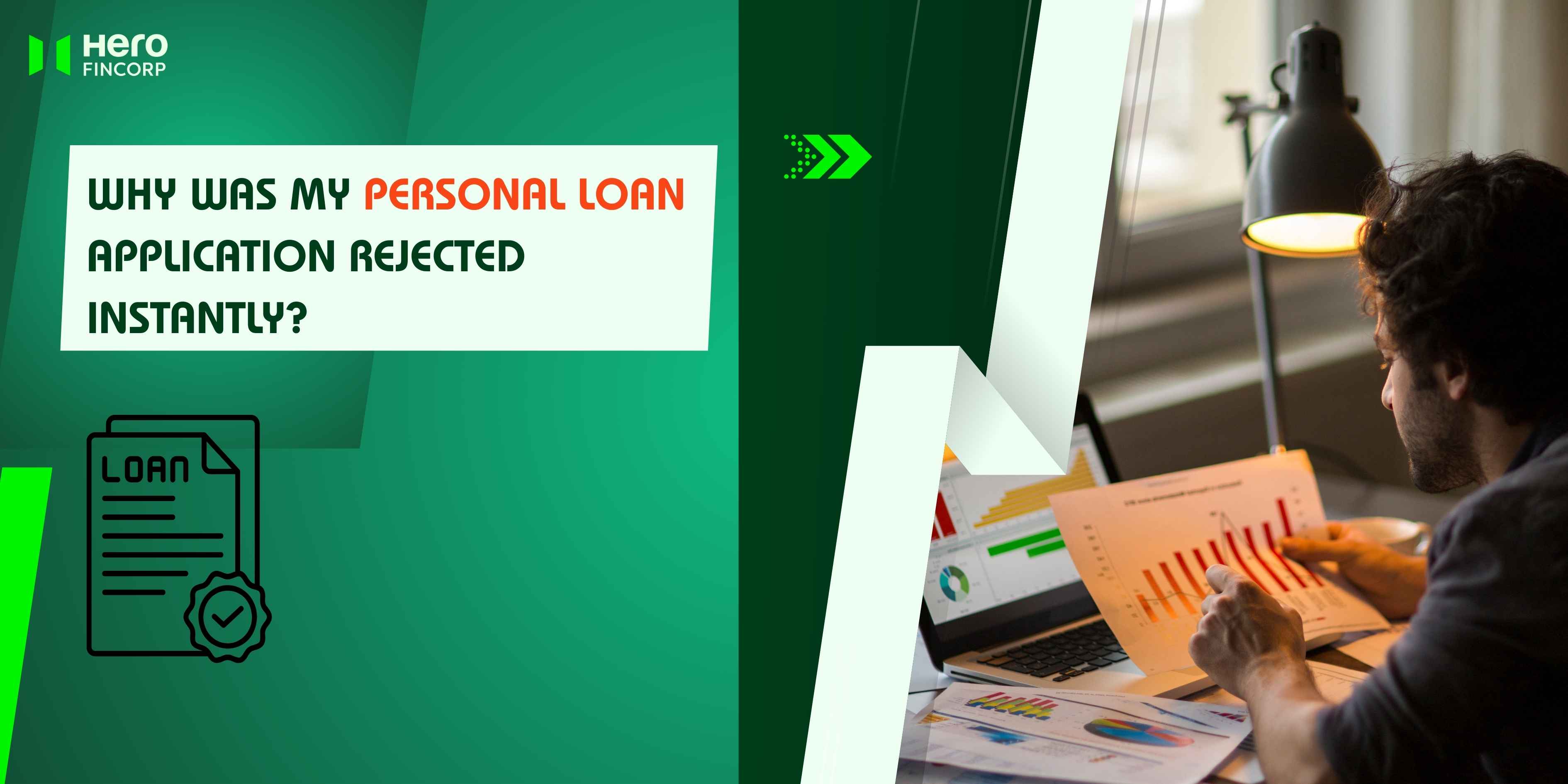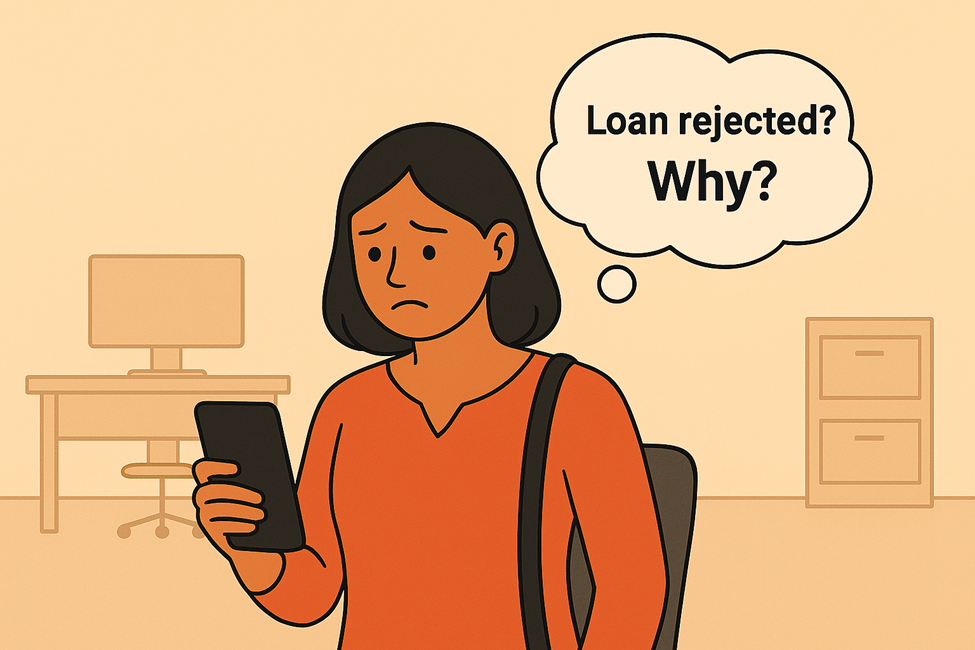Why Was My Personal Loan Application Rejected Instantly?

So you finally got your much-awaited appraisal. Now is the perfect time to visit your dream destination, and you applied for a personal loan. But then your application got rejected.

Why? Because lenders don’t consider your salary alone. They go through your credit report, existing EMIs, repayment history, and a few other things to assess your creditworthiness.
Let's break down some common reasons personal loans get denied.
7 Common Reasons for Instant Personal Loan Rejection
Here’s what usually triggers an instant personal loan rejection.
1. Bad Credit History Hurts Approval
Financial institutions rely heavily on your credit score to decide whether to approve your personal loan or not. If you’ve ever missed an EMI repayment, that’ll drag your score down.
Plus, constantly applying for loans is another red flag. Every time you enquire about borrowing and every time your credit history is fetched, it affects your credit score.
How to Fix - Make sure you pay your dues on time, avoid unnecessary loan enquiries, and keep your credit report profile strong.
2. Unstable Employment History
Lenders want to see stability. If you’ve switched jobs too often or have unexplained gaps in employment, it signals risk. They’re unsure if your income is reliable enough to repay the loan. Even a high salary won’t help if your employment status seems unpredictable on paper.
How to Fix - You should be employed at an organisation for at least six consecutive months to ensure a stable source of income.
3. Mismatch in Eligibility Criteria
Even if your credit score looks good, missing basic criteria can get your loan rejected instantly. Lenders have set cutoffs for salary, age, and job type. If you fail to meet the criteria, your application can be rejected.
How to Fix - You must meet the following eligibility parameters -
● Age - Between 21 and 58 years
● Citizenship - Indian
● Work Experience - At least two years of business operations for self-employed individuals and six months of experience in their current job for salaried individuals
● Monthly Income - At least ₹15,000
4. Too Many Existing Credit
If you’re already juggling multiple EMIs, be it credit cards, vehicle loans, or a home loan, lenders see it as a strain on your repayment capacity.
Even if your income looks decent, a high debt-to-income ratio signals risk, and your personal loan application may get rejected. Banks want assurance that you would be comfortably able to pay up your dues.
How to Fix - Try to repay your high-interest debt first. Also, make sure the EMIs you’re paying are less than 40% of your total income to ensure efficient debt management.
5. Incomplete or Incorrect Documentation
Lenders won’t chase you for missing paperwork. If your ID proof doesn’t match your address, or income documents can’t be verified, the system simply rejects the application. Even small errors, like a name mismatch, can block approval.
How to Fix - Always double-check before you apply for a personal loan. You can also apply for a personal loan at Hero FinCorp to enjoy a paperless application process that is quick, simple, and hassle-free.
6. Multiple Loan Applications at Once
If you’ve applied to several lenders in a short span, it shows up on your credit report. To lenders, that looks like desperation. It lowers your credit score and makes you appear risky, even if you’re just exploring options.
7. Other Red Flags
Missed EMIs, previous loan defaults, or inconsistent income (especially for freelancers or business owners) can hurt your credibility. False info on your application? That’s an instant rejection. Lenders are quick to shut the door if anything seems off.
Improve Your Chances Next Time
Whether you’re salaried or self-employed, the golden rule is simple: keep your financial records clean from the very beginning. Start by checking your credit report for errors, maintaining a stable job history, and avoiding applying to multiple lenders at once.
Ready to reapply with confidence? Get started with Hero FinCorp’s instant personal loan process. No piles of documents, no back-and-forth. Just a smooth experience from start to finish.
Frequently Asked Questions
1. Can I reapply immediately after my personal loan gets rejected?
It’s better to wait and fix the issues first. Check your credit score, clear dues, or update documentation before applying again. Frequent reapplications may further hurt your credit.
2. What is the minimum credit score needed for a personal loan?
Most lenders prefer a score of 750 or above. However, a stable job history, low existing EMIs, and correct documentation can also improve approval chances.
3. If I check my credit report, will it reduce my credit score?
No, if you check your credit report it does not reduce your score, But if your apply for loans at multiple lenders, that will affect your score.
Disclaimer: The information provided in this blog post is intended for informational purposes only. The content is based on research and opinions available at the time of writing. While we strive to ensure accuracy, we do not claim to be exhaustive or definitive. Readers are advised to independently verify any details mentioned here, such as specifications, features, and availability, before making any decisions. Hero FinCorp does not take responsibility for any discrepancies, inaccuracies, or changes that may occur after the publication of this blog. The choice to rely on the information presented Here is at the reader's discretion, and we recommend consulting official sources and experts for the most up-to-date and accurate information about the featured products.